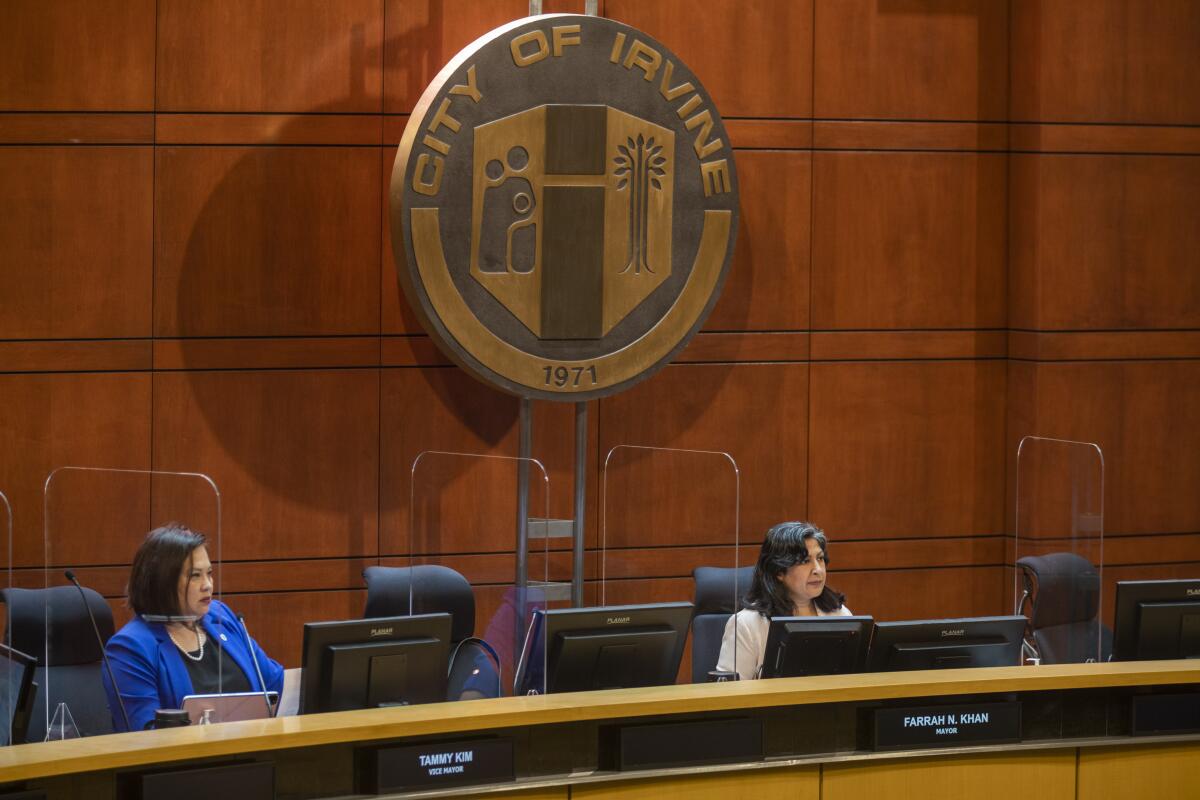Irvine moves forward with toughening up its lobbying law

- Share via
A year after being first proposed, the Irvine City Council has voted to add teeth to its existing lobbyist regulations.
Council members approved a first reading of the ordinance during Tuesday’s meeting. The changes are set to broaden the definition of lobbyists and their activities and make repeated violations of the law a misdemeanor offense.
Councilwoman Kathleen Treseder first proposed a series of reforms to the law in the wake of political corruption scandals that erupted in Anaheim and Irvine.
In 2022, Anaheim officials ordered a sweeping independent probe into political corruption following the surfacing of an FBI investigation that led to the conviction of former Mayor Harry Sidhu and the termination of the Angel Stadium sale.
A report released the following year alleged a criminal conspiracy surrounding federal pandemic relief funds and recommended a host of reforms aimed at curbing corruption.
Irvine declined to authorize its own independent probe.
But in a memo to City Manager Oliver Chi authored last year, Treseder sought to implement changes in Irvine inspired by the Anaheim report, including strengthening its lobbying law.
“Irvine was named 11 times in the context of a cannabis-related proposal in April 2018,” the memo read. “In connection with this proposal, Melahat Rafiei, a political consultant, was indicted and pleaded guilty to a felony charge of attempting to defraud one of her political consultancy firm’s clients.”
In the plea deal, Rafiei also admitted to attempting to bribe two Irvine council members in relation to a retail cannabis ordinance. She is set to be sentenced at a federal courthouse in Los Angeles on Nov. 8.
According to a plea agreement, Melahat Rafiei told a commercial cannabis company owner that she would work to pass a marijuana related ordinance in Anaheim in exchange for at least $300,000.
The FBI investigation didn’t surface during Tuesday’s discussion.
Instead, following a study session last November, Irvine City Atty. Jeff Melching outlined the proposed changes to the law, which was first passed in 2006.
“The lobbying ordinance is fundamentally about disclosure,” he said. “It doesn’t prohibit people from lobbying.”
It seeks to expand the definition of lobbying to include contacting any city officials with decision-making powers. The updated language also modernized the ways in which lobbyists can contact city officials with social media and other electronic means of communication in mind.
“It’s definitely heading in the right direction of what we need to do in order to close a lot of the loopholes,” said Councilwoman Tammy Kim.
The proposed changes would widen who is considered a lobbyist to include “in-house” and “expenditure” lobbyists not previously covered.
Reporting requirements are also set to be more detailed, including if a registered lobbyist has contributed $100 or more to the campaign of an elected official being contacted.
Irvine is looking to drastically draw down the lobbyist registry requirements. As it stands now, individual lobbyists only have to register if their paid contact exceeded $10,000 per quarter. The revised rules would compel registration if paid lobbying tallied $1,000 or more in a calendar month.
Added enforcement teeth come in the form of a misdemeanor offense for repeated violations of the law.
“We would not begin with a criminal enforcement mechanism if we found somebody out of compliance,” Melching said.
But subsequent violations would include fines of $1,000 per day.
Both Treseder and Kim asked Melching about exemptions from the law for media professionals.
“Are we looking for credentialed press?” Kim asked. “Are we going to be requiring a press pass? I just want to tighten what we are calling media and journalism.”
Melching responded that there would be no press pass requirement for exemption and that media is defined the way it was in 2006, when the law originally passed, to included newspaper, radio, television, wire service and regularly published periodical reporters.
Interviews and records provide a rare insider’s look at the influence of unelected power brokers in the city that is home to Disneyland and the Angels.
Councilman Mike Carroll proposed an amendment to the updated lobbying law that would ban council-appointed commissioners and committee members from lobbying Irvine, a loophole that existed under previous ethics ordinances that covered the mayor, council members and council staff.
“We’re in a very weird world where if we pass this tonight as it’s proposed, you could be a lobbyist for the city of Irvine and still serve as a council member or a commissioner or a committee member,” Carroll said.
Treseder had no issue with the proposed amendment but made a political point with November’s City Council elections in mind.
“It does give the appearance that council member Carroll is using his position to attack Commissioner Ayn Craciun,” she said. “She is his opponent for the council race.”
Some residents had questioned Craciun’s role as chair of Irvine’s Sustainability Commission with her advocacy work in Irvine as Climate Action Campaign’s policy director.
But with Carroll’s council colleagues finding his amendment agreeable, changes to the lobbying law were passed unanimously.
It will come back before council for a second procedural vote at a future meeting.
All the latest on Orange County from Orange County.
Get our free TimesOC newsletter.
You may occasionally receive promotional content from the Daily Pilot.






